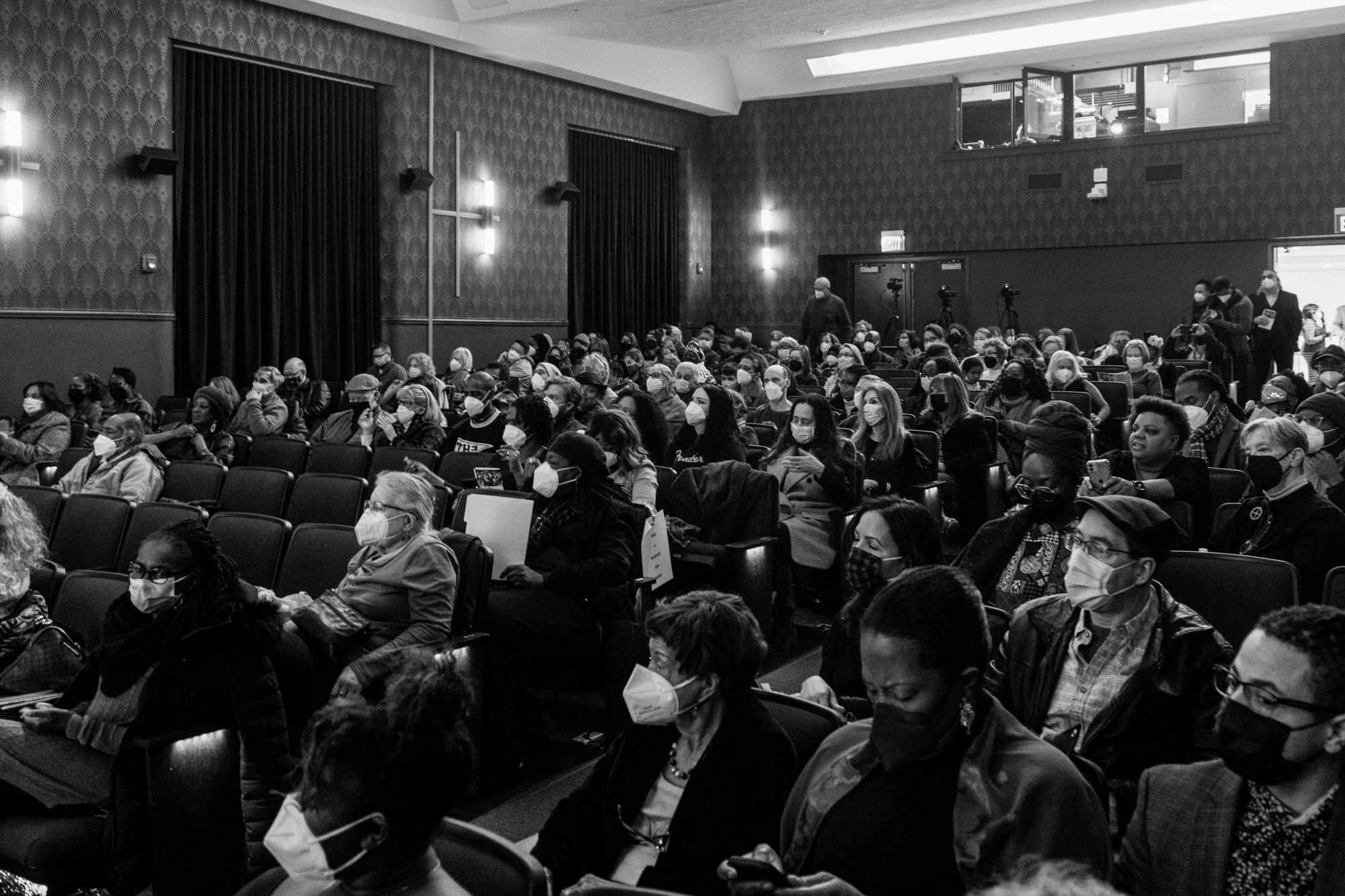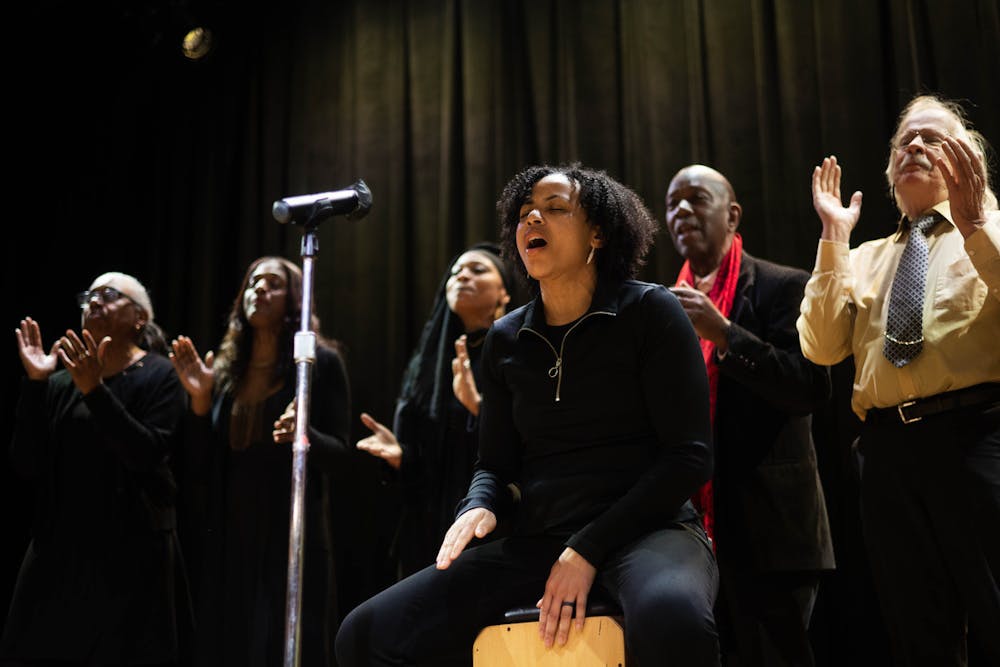Founded in 1994, the Langston Hughes Community Poetry Reading shares the work and wisdom of the Harlem Renaissance poet with the Providence community. The event brings together artists and community members to celebrate the work of Hughes and enjoy an afternoon of poetry, storytelling and performance.
This year’s event, hosted Feb. 5 by the Providence Public Library, brought together more than 400 people. The Herald spoke to the Poetry Reading’s organizers, artists, collaborators and participants to understand how the organization has tapped into Hughes' legacy to foster community and celebrate Black creativity.
"Hold fast to dreams": Founding and organizing
The Poetry Reading’s founding in 1995 was preceded by the creation of the now-closed Langston Hughes Center for The Arts and Education, according to April Brown, co-director of the Poetry Reading. The Center was a nonprofit focused on incentivizing the exploration of Hughes’ work and the Black community’s artistic creativity.
The late George Houston Bass, professor of theater arts and Afro-American studies and a member of the Center’s Board of Directors, was the first to suggest the possibility of expanding the mission of the center to a community-focused event, according to Houston Bass’s wife, performer and educator Ramona Bass Kolobe ’72. Houston Bass, who worked as Hughes’ secretary and literary assistant, was also the administrator of the poet’s estate following his death in 1967.
The center, which was designed to cultivate “Black storytelling,” has now “grown into the community poetry reading we know today,” Bass Kolobe said in an interview with The Herald.

The Langston Hughes Community Poetry Reading was designed to cultivate “Black storytelling” and to “encourage people to read the works of Langston Hughes,” said Ramona Bass Kolobe.
Courtesy of Aiyah Josiah Faeduwor
For Brown, joining the Poetry Reading in 2015 was not a decision but an “inheritance.”
“It’s really been a labor of love, but also a labor of love (for) community and Langston,” she said. “We love what Black arts did for us personally and for our extended family and for our extended community.”
“The least we can do is to celebrate a great writer who has such a breadth and depth of experience, particularly the Black experience,” Brown added.
For Co-Director S. Kai Cameron, awarded educator and activist, the Poetry Reading is a way to preserve community engagement with Hughes’ work. "His work is just so relevant. It is really, truly timeless … (and) related to what's actually happening in the world today," she said.
He “challenged the status quo,” Joe Wilson Jr., artist and director of the Office of Art, Culture and Tourism for the City of Providence, said in an interview with The Herald. “He demanded answers to critical questions around social justice.”
‘My people. Story-tellers all, — My people’: A day of celebration, unexpected performances
Brown said she considers the annual Poetry Reading event “part community meeting, part church meeting, part birthday party.”
Despite the intense work necessary to organize the event every year, Brown said its main strength is that it “belongs” to the community.
This year, award-winning educator and poet Damont Combs, who often goes by Mr. Orange Live, performed the poem “Harlem Night Club” with his son D Blue Jay.
“What I love about the day of the performance (is that) you don't really know what's gonna happen,” Combs said.

The event offers community for artists who would not have had the chance to connect otherwise.
Courtesy of Aiyah Josiah Faeduwor
For Bass-Kolobe, it is precisely that unpredictability that ensures the event's survival. “I think that every year it has a different flavor,” she said. “It has longevity simply because the community is committed to having the experience every year.”
The event brings artists and people together, some of whom might have never connected otherwise, according to Wilson. “We don’t always have a chance to be in a community in that way … it's important that we're given the space to see each other … and celebrate being seen,” he said.
‘My soul has grown deep like the rivers’: Community, storytelling, healing
For Bass Kalobe, who performed the poem "Laughers" this year, the event is also a space of healing. “I got to the end of the poem (and) I said to the audience: now everybody just laugh,” she said. “I've never had that experience. … It wasn’t laughing at anyone, or laughing with someone. It was laughing together and it was very healing.”
For Valerie Tutson ’87 MA’90, an award-winning storyteller and executive director of Rhode Island Black Storytellers, the event taps into the importance of storytelling as a method of understanding one another and the world, even if the answers “only exist for that moment of shared telling and listening.”

To Valerie Tutson '87 MA'90, award-winning storyteller and executive director of Rhode Island Black Storytellers, the event highlights the role of storytelling in understanding the world.
Courtesy of Aiyah Josiah Faeduwor
Tutson also encounters healing in the process of storytelling. In the aftermath of the murders of George Floyd and Tyre Nichols, Tutson said that it’s the job of storytellers to turn “trauma into gold … because otherwise, we will not survive.”
‘I look at the world’: Expanding the project
The Poetry Reading recently began a partnership with PPL, allowing the program to be more accessible to community members. Christina Bevilacqua, programs and exhibitions director for PPL, said that she has been interested in making the library’s resources more accessible to ongoing community programs.
The Poetry Reading occupies a “tremendous space in the community” because of its intergenerational nature, which allows individuals of all ages to view Hughes as a “touchstone” in their lives, Bevilacqua said.
“One of the things that was really gratifying at the event … (was that) several people said to me: Now I know that Black History Month has started,” Bevilacqua said. “People were just really, really happy.”

The poetry reading gives community members an opportunity to understand the history and experiences of Black communities.
Courtesy of Aiyah Josiah Faeduwor
Beyond celebrating the work of Langston Hughes, the Poetry Reading offers community members a way to understand historical and present experiences shared by the Black community.
The Poetry Reading developed an educational curriculum to engage students “in the world of Langston Hughes … particularly in the context of the Black aesthetic … (and) the Harlem Renaissance,” Brown said. The Poetry Reading piloted the curriculum at Pawtucket’s Lyman B. Goff Middle School.
According to Brown, the pilot program was also a learning experience for the organization. “What we understood is that you can take an artist like Langston Hughes, surrounded by different contexts, and children can learn,” she said.
The Reading is still working on expanding the curriculum further and securing permanent funding, Brown added. “We're looking for people who could (meet) us halfway.”
In future years, Bass-Kalobe wants to encourage the Poetry Reading to feature more artists that can perform Hughes’ poetry in other languages. “There's some things about his writing that don't need translation because they're like the hums of the heart.”

Julia Vaz was the managing editor of newsroom and vice president on The Herald's 134th Editorial Board. Previously, she covered environment and crime & justice as a Metro editor. A concentrator in political science and modern culture and media, she loves watching Twilight (as a comedy) and casually dropping the fact she is from Brazil.





